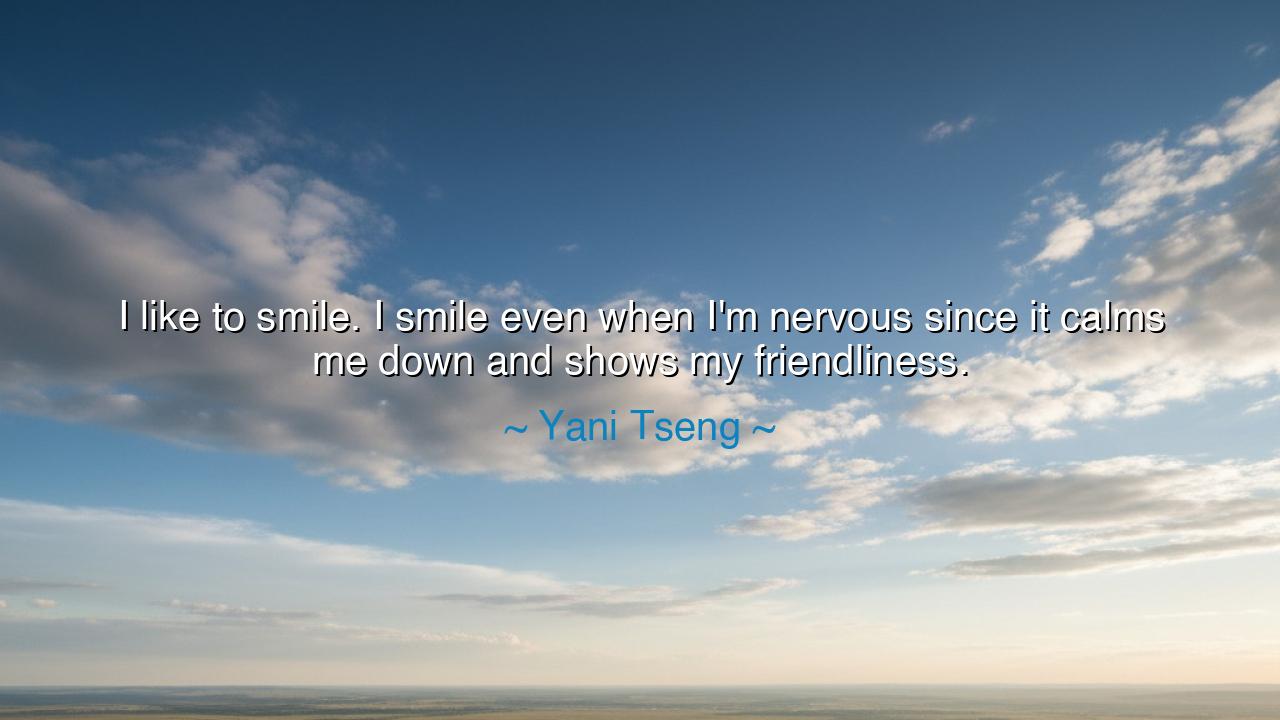
I like to smile. I smile even when I'm nervous since it calms me
I like to smile. I smile even when I'm nervous since it calms me down and shows my friendliness.






The words of Yani Tseng, “I like to smile. I smile even when I'm nervous since it calms me down and shows my friendliness,” are both simple and profound. They reveal the ancient secret of the smile: that it is not merely an expression of joy, but also a shield against fear, a bridge between strangers, and a signal of friendliness that draws the hearts of others closer. In a world where nervousness and uncertainty are constant companions, Tseng teaches us that the humble act of smiling transforms weakness into strength, and fear into peace.
The meaning of this truth rests on two pillars: self-mastery and connection. When one is nervous, the body trembles and the mind races; the spirit becomes unsteady, like a boat in stormy seas. Yet a smile, though small, steadies the soul. It tells the body, “Peace is within me,” and it tells others, “I mean no harm.” This is wisdom passed down from the ancients, who believed that gestures of calmness, even in the face of danger, command respect and build trust. To smile when one is anxious is to hold dominion over oneself, rather than letting fear dictate one’s actions.
Consider the example of Abraham Lincoln, who bore the weight of a fractured nation upon his shoulders. Though tormented by grief and doubt, he was often remembered for his ready smile and gentle humor. In moments of political crisis, his smile disarmed enemies and reassured allies, calming the storm around him. Like Tseng, he understood that a smile could calm the heart and show friendliness, even when the world pressed hard against him. In this, we see that what seems a simple gesture carries the power of great leadership and endurance.
The origin of Tseng’s insight lies in her life as an athlete, where the eyes of many are fixed upon her, and pressure mounts like an unyielding mountain. The golf course is silent yet heavy with expectation; nervousness is natural. But she learned that smiling loosens the chains of anxiety, allowing her movements to flow more freely. Ancient warriors too knew this secret—before battle, they would chant, laugh, or smile to dispel fear and to show their comrades that courage was alive within them. Thus, the smile becomes both weapon and balm.
We must understand also the power of friendliness in human affairs. A smile is a universal language, older than written words, recognized by all nations and tribes. It melts suspicion, eases tensions, and forges bonds where there was distance. History shows us how Mother Teresa, walking the streets of Calcutta, brought dignity to the forgotten not through riches, but through her gentle smile. For the outcast and the poor, that simple act was proof of love, and it transformed despair into hope.
The lesson for us is clear: when fear arises, do not let it rule you. Smile. When you stand before strangers, do not let suspicion build a wall. Smile. When you are nervous and unsure, let your face declare peace and friendliness before your heart fully believes it. The smile is not hypocrisy; it is a compass, guiding your spirit back to calmness and inviting others to walk with you.
Practical action is within reach for all. Each morning, practice the art of smiling before the day’s anxieties descend. In moments of tension—whether in the workplace, in study, or in personal encounters—choose to lift your face into a smile, even if your heart quivers. You will find that your spirit steadies and that those around you open themselves in return. The ancients would say: “He who smiles in battle wins twice—once against fear, and once for the hearts of men.”
Thus, dear listener, guard this teaching. For the smile is both shield and sword, both medicine and message. Use it as Yani Tseng has taught—not only when joy fills you, but even when nervousness presses upon you. In doing so, you shall walk through life with calmness in your heart, light upon your face, and the friendship of many at your side.






AAdministratorAdministrator
Welcome, honored guests. Please leave a comment, we will respond soon